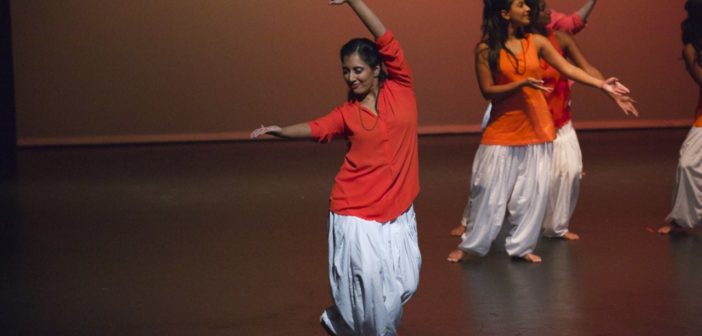With a dancer’s grace and a lawyer’s sensibility, Dr. Supna Jain is a one-of-a-kind professor at North Central College. From teaching students how to create fulfilling interpersonal relationships to embracing her Indian heritage through her nonprofit dance troupe Aavegh (“passion”), she has made an impact on nearly everyone she encounters.
Jain is a half-time assistant professor of communication with a law degree and a special interest in interpersonal relationships in organizational and intercultural contexts. Her most recent work has been on the subject of the Bahu, the Indian daughter-in-law, and the negative impact this role has on women — a topic that she holds dearly.
Alongside Dr. Mara Berkland, who is also a professor of communication at the college, Jain delved into the cultural context of the Bahu. Their intensive research led them to devastating realizations on the subject, and Berkland found herself more involved than she had planned to be. “She has this sort of loving sense about her, but I can’t express how powerful that is,” said Berkland. “She’s able to engage people and pull them in a direction almost without them noticing it.”
Berkland describes Jain as a “joyful nudger,” meaning that she will check in on you and hold you accountable but in a motivating and upbeat way that fits in with her constantly-moving pace. “She’s a little whirlwind of activity,” said Berkland.
Always finding something to work on, Jain incorporated her passion for dance with the often heartbreaking information they had uncovered in their research to create “The Making of a Bahu.” Turning narratives into choreography may seem like a challenge, but Jain’s talent and grace as a dancer led to a unique way of presenting scholarly research.
For her research assistant, this was an unexpected yet rewarding way of conveying the research they found to audiences that warmly received the messages. “I’m not an artist, I don’t ever think about my research that way, and I certainly don’t think of it as embodied by dance, but it was a more powerful way of showing what we found than a lecture showing statistics and charts, and that was really amazing,” Berkland said.
For students like Upasna Barath, ’18, it was a rare, breathtaking portrayal of Indian culture on campus. “Seeing a professor show it off proudly through a significant art form for a significant cause was awesome,” she said.
The power and beauty of this performance is not alone. Through her dance troupe, Jain has dedicated years to producing thoughtful work that encapsulates the social issues she is committed to. Aavegh’s executive director Manjima Bose, a close friend of Jain’s, has worked with her since 2005 when she auditioned for the studio’s first production.
Upon first meeting her, Bose said: “I was a bit in awe of her for her boldness and strength to not just consider creating something like Aavegh, but in actually taking the initiative to create this opportunity for herself and others.”
Despite being impressed by her raw talent and creativity, Bose also admires her ability to be an amazing friend, mother, daughter, sister and aunt. “Whatever it is that she does, whether it’s with Aavegh, as a professor, her relationships with family and friends, she truly does give and put 100 percent of care, effort, thought and love toward it,” she said. “I honestly can’t say that of everyone.”
With both strong personal and professional relationships, Bose and Jain are able to grow together as performers and as friends. Jain’s ability to balance having a strong work ethic with a friendly, approachable personality is something that her students have noticed.
Chelsea Spear, ’17, worked closely with Jain following her suggestion to present a research manual from class at the College’s annual Rall Symposium; she realized just how empowering and commending Jain was as a professor. Barath also shared these thoughts.
“She is one of those professors that remind you why you chose to go to college and receive an education,” said Barath. “She reignites curiosity, motivates you to work hard and her assignments have long-term effects on work ethic and future job prospects.”

